Final Destination 2
Final Destination 2, directed by David R. Ellis, is entertaining in rather the same way that “World’s Scariest Police Chases” and similar “reality” TV shows are entertaining, only for the opposite reason. Reality TV appeals to us because, even though we know it is heavily edited, we are excited by the possibilities for frightening or funny or sexy contingencies when the TV gods have provided no script in advance. In the case of Final Destination 2, however, we are fascinated by the suggestion that there may be a hidden script in what might at first appear to be mere contingency.
In other words, is Death stalking our heroine, Kimberly Corman (A.J. Cook), and the miscellaneous collection of others whom her premonition of a horrific freeway pile-up has saved from a fiery end? It helps to have seen the original Final Destination (2000), which was based on the same premiss — namely that when a horrible future disaster is made manifest in a vision and then, as a result of same, is forestalled, the gods or the fates will find some other way to claim their original victims. Though death may be cheated, “Death” will not be.
I found this quasi-personification of the enemy the least satisfactory thing about the picture, and there are several moments where people are attacked by weird, Poltergeist-y goings-on that seem hokey and unnecessary.”Fate” would have been better. La Forza Del Destino. We want something more like the Sufi legend of the Appointment in Samarra in which a rich man’s servant, seeing Death in the marketplace in Baghdad, asks his master for the use of a horse so that he can ride to Samarra and hide out from him there. Later, the rich man sees death in the marketplace and asks him why he frightened his servant. “I was just surprised to see him in Baghdad,” says Death, “since I have an appointment with him tonight in Samarra.”
The movie offers a certain amount of this kind fatalism, but the quantity of its appointments in Samarra lessens the impact of any one of them. It is important, I think, for us to feel that individually these “freak accidents,” though unlikely, could happen — and could happen to us — in order for them to seem collectively purposeful. At any rate, the little frisson down the spine that comes from thinking them so is what the audience will have come for, and it bespeaks a supernatural plan and presence so powerful that it doesn’t have to resort to the vulgar conjurer’s tricks by which windows shut without explanation or a hospital trolley moves of its own apparent volition.
Even where they are portrayed more naturalistically, the movie seems to be much more interested in the sheer movie-mechanics of arranging a series of bizarre accidental deaths that are also, not incidentally, screamingly funny. Not that there is anything wrong with that. For whatever its faults, it offers us a series of wonderful if ghastly surprises as all the characters we like least are polished off one by one. The best of these, including not one but two freeway pileups (the one in the premonition and the one that actually happens after Kimberly blocks the on-ramp) and the highly amusing death of an obnoxious lottery winner, confident — too confident — of his own luck, are almost worth seeing the movie for.
As usual with the teen-horror genre, the trouble starts when one or two of the characters, in this case 18-year old Kimberly with her fetching sleepwear and Officer Burke (Michael Landes), the state policeman who helps her to warn the others, become too likeable. Audiences don’t want to see them die, and so the script is forced to resort to dubious metaphysics to explain their survival when all the rest have met their bloody ends. True, we were fascinated by the idea of an unexpectedly scripted reality, but one written by destiny and not by Hollywood focus groups.
Discover more from James Bowman
Subscribe to get the latest posts to your email.








